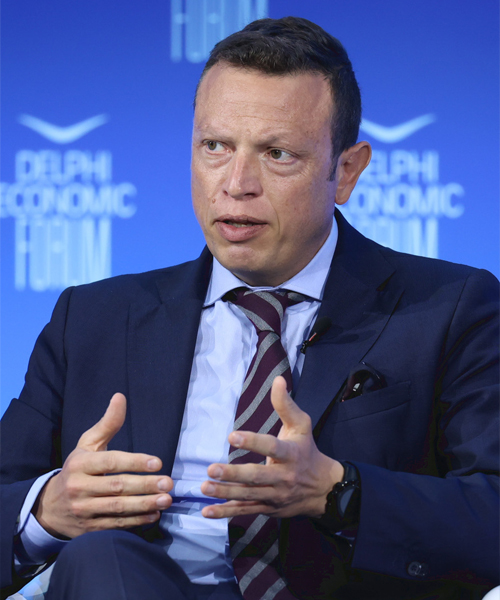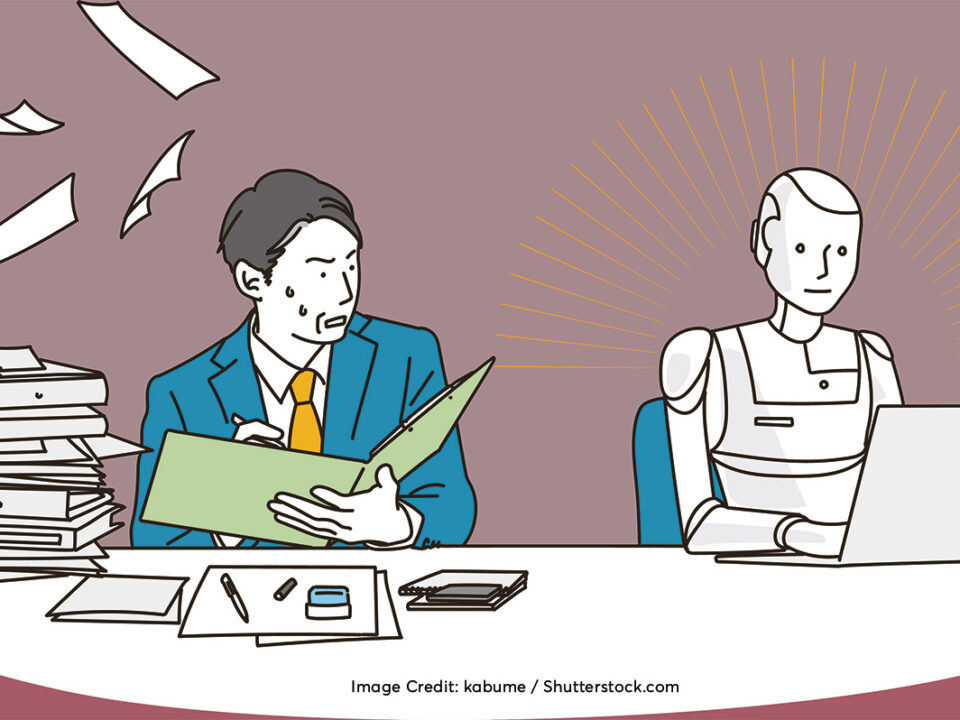The future of work from the perspective of foresight

Predictions vs. dynamic estimates
Heraclitus was the first to introduce the concept of perpetual change, which is condensed into his phrase ‘everything flows’. However, for many centuries the changes experienced by people, including in the workplace, were extremely slow or gradual, and usually were not perceptible within a human lifetime. The industrial revolution brought about the acceleration of change, but today the world is transforming at a pace and in directions that we have never seen before. At this point, we should distinguish between deterministic predictions and non-deterministic dynamic estimates.
One could claim that the deterministic view is represented by futurists like the American inventor Ray Kurzweil [1], who ‘predicts’ that the now exponential evolution of technology (Artificial Intelligence) will surpass human intelligence, and that by the early 2030s the magnitude of non-biological computational power will surpass the capacity of total human intelligence, while ultimately the exponential increase in computer capacity will lead to the so-called Singularity. Kurzweil very clearly identifies the date: ‘I set the date for the Singularity – which represents a profound and radical transformation in human capability – as 2045.’
Contrary to the deterministic predictions of Kurzweil, those of us who are systematically involved in interdisciplinary Futures Studies, and specifically Foresight, as a participatory process of understanding the trends in environmental transformation and alternative strategic foresight, formulate dynamic estimates but give predictions a wide berth. Every attempt to ‘predict’ the future, not just of work, results in a series of almost insurmountable obstacles that, to a great extent, are due to the very nature of the subject of our research: how is it possible to find something that by definition…does not exist? The future never exists in the present, but as a mental conception, it gestates in the present and impacts it in a non-linear manner [2].
The future of work and music chairs
Many of us grew up playing musical chairs. The music starts and we go round and round. Some people dance with abandon, while others linger over each chair as they pass, waiting for the music to stop.In the end, the music stops and, inevitably, a child ends up without a chair. It’s a fun – seemingly innocent – game, which nevertheless represents the primordial and violent Hobbesian struggle for survival. Unfortunately, the rules of musical chairs also apply to the present and future of work – this is not an innocent game at all [6,7]! Every time the music stops, someone loses a job to automation. When the music stops again, a full-time job has become a part-time job. The music stops again, the government cuts some services, taxis are replaced by Uber, or a new pandemic breaks out and more jobs are lost or transformed.
Many articles on the future of work appear in the global media, often focusing on the ‘threat’ posed to jobs by robots and automation. Some industry leaders have expressed support for a tax on robot labor and for universal basic income programs [5], while unions have launched or support various programs for the future of work. Conferences and scientific meetings on the ‘future of work’ have taken place almost everywhere, there are vast numbers of studies on the topic, but the approaches are often unilateral and do not comprehensively monitor the complicated, multi-level and complex system of dynamic changes, of which work is just one manifestation.
Amid the flood of articles on future working conditions [8], there is also the social reality. It seems that the real ‘winners’ are those who adapt to and benefit from the transformations and those who prepare appropriately, understanding the coming – usually inevitable – disruptions and changes, competing with each other to ensure they don’t find themselves ‘without a chair’. What ultimately appears to be of crucial importance is the ability to use foresight and dynamic diagnosis of things – a relational and proactive understanding of the system.
Globalization 4.0
The public debate on the rapid advent of the new digital phase of globalisation (known as Globalization 4.0) came to the fore during the proceedings of the 2018 World Economic Forum. In light of the Fourth Industrial Revolution, Globalization 4.0 places our lives in the dynamic of the complete digitization of the social, political, economic and work spheres [10]. A non-linear and unpredictable dynamic that may entail the mushrooming of productivity, but at the same time the further shrinking of the middle class, labour polarisation, income erosion, precarious working conditions, unsustainable inequalities and other existential risks.
We therefore need to protect the ‘losers’ of this radical transformative change (those who cannot or do not want to follow) by creating proactive and inclusive labour market and employment policies, with special emphasis on young people not in employment, education or training (NEETs), robust social safety and resilience networks, as well as inclusive healthcare systems. In other words, proactive and future-oriented policies that will strengthen social cohesion and social trust, because the wealth expected to result from these changes must benefit all sectors of society. This may mean, among other things, alternative platforms and regulated systems that are suitable to protect work dignity, upgrade the status of the worker and the democratic citizen, and address the inconceivable complexity of the emerging wave of digital global integration.
The digital phase of ‘global integration’, which is difficult to discern because it is happening so fast, largely relies not on free trade and the reduction of trade barriers and tariffs (see Globalization 3.0), but on the almost constant and uninterrupted connectivity between national digital and potential systems, and therefore on the continuous international flow of technologies, knowledge, innovation, ideas and services. This is the hard core of Globalization 4.0 [11].
But new technologies are always anchored in the specific cultural context and workplace realities of each country, so that convergences and divergences arise. The emerging digital society adapts its structures and culture to heterogeneous networks and the logic of processing speed. Heterogeneous networks take the place of homogeneous operating systems, as we know them from modern society, fuelling new pressures, divisions, discriminations and inequalities. In particular during the pandemic, those who felt the most pressure globally were the so-called gig workers, workers in the economy of individual deliverables.
Foresight perspectives
Of course, the pandemic disrupted labour relations in Greece too. New inequalities are appearing, while older ones are deepening in the competitive work arena. As long as the platform economy dominates, we need new institutions (institutional capital) to safeguard labor rights, the work ethic, and economic and labor security and dignity in order to prevent burnout and polarisation. By the same token, and in a timely manner, we need to create a safety net for workers who are left out of the game. Upskilling and reskilling by the state and enterprises themselves will play an important role.
The debates sparked over efood are a ‘weak signal’ for everything that will follow. Although we are currently in uncharted waters as far as the gig economy is concerned, as a society we must understand these messages and then design, through deeply inclusive processes, the possible scenarios, which policies we would prefer to help shape the future of work, so that we do not find ourselves playing catch-up with actual developments.
So, we need to consider the medium-term changes in the workplace, as they are expected to result from a series of megatrends [3]: climate crisis, increase in consumption, globalisation, geopolitical turmoil, migration, demographic inequalities and, of course, exponential technological development. Megatrends transform everyday life, but also determine the trajectory of future developments, providing a solid basis for studying the future of work.
We also need to explore the long-term future (up to 2050) – for example, taking as our guide long-scale global research such as the Millennium Project [4], in which Greece participated. This research project resulted in three detailed global scenarios for the future of work: the scenario of the ‘self-actualization economy’, the scenario of ‘future despair’ and a ‘mixed scenario’. Looking further ahead, though, we also need to consider an array of technologies we call Next Technologies [4], which will transform the future as we approach 2050. Many believe that artificial intelligence, autonomous vehicles, 4D printing, developments in nanotechnology, robotics, biotechnology and cognotech – and especially the multiple synergies between them – are likely to help humanity respond to emerging environmental, economic and social challenges as we move towards an overpopulated world of 9 billion people by 2050.
However, technology alone is not enough, and technological solutionism is not working either. Human choices matter. Against the visible risks of techno-populism, anti-liberal democracy and cultural regression, we need to collectively reflect on our values, understand hopes and fears (dreams and nightmares), and contribute one and all to serious global policies that will be implemented by governments, companies, educational systems, NGOs, the UN, and other international organizations.
Drawing on the above analytical context, the main goal of these policies must be the liberation of humanity from the obsolete ‘used-up future’ [9]. As futurist Sohail Inayatullah aptly points out, policies still tend to follow the same development motif they have followed in recent decades. Instead of spending resources on growth without vision, we should already have focused on creating a sustainable future for all. Now we need to find holistic, interactive, and collectively agreed-upon ways to create a new ‘future’ – from the bottom up – in the field of work that will ensure the protection of the planet and human dignity.
Bibliography
1. Kurzweil, R. (2005). Singularity is Near: When Humans Transcend Biology. Viking Press.
2. Miller, R. (2018). Transforming the Future: Anticipation in the 21st Century. Routledge. Retrieved June 28, 2018, from https://www.routledge.com/Transforming-the-Future-Open-Access-Anticipation-in-the-21st-Century/Miller/p/book/9781138485877
3. Joint Research Centre. (2022). The Megatrends Hub. Retrieved February 2, 2022, from https://knowledge4policy.ec.europa.eu/foresight/tool/megatrends-hub_en
4. Glenn, J.C., Florescu, E., & The Millennium Project Team. (2019). Work/Technology 2050: Scenarios and Actions. The Millennium Project. https://www.millennium-project.org/projects/workshops-on-future-of-worktechnology-2050-scenarios/
5. Kharpal, A. (2017, June 2). Bill Gates wants to tax robots, but the EU says, “no way, no way.” CNBC. https://www.cnbc.com/2017/06/02/bill-gates-robot-tax-eu.html
6. Ramos, J. (2017, February 23). The Future of Work. Green Agenda. https://greenagenda.org.au/2017/02/the-future-of-work/
7. Mount, I. (2019, July 2). Spain’s musical chairs over jobs: ‘Today you work, tomorrow I do.’ Financial Times. https://www.ft.com/content/9312c566-9ca1-11e9-b8ce-8b459ed04726
8. Porter, E., & Manjoo, F. (2016, March 8). A Future Without Jobs? Two Views of the Changing Work Force. The New York Times. https://www.nytimes.com/2016/03/09/business/economy/a-future-without-jobs-two-views-of-the-changing-work-force.html
9. Inayatullah, S. (2008). Six pillars: Futures thinking for transforming. Foresight, 10(1), 4–21.
10. Schwab, K. (2019, January 22). Παγκοσμιοποίηση 4.0 | Foreign Affairs—Hellenic Edition. https://www.foreignaffairs.gr/articles/72126/klaus-schwab/pagkosmiopoiisi-40?page=show
11. Baldwin, R. (2019). The Globotics Upheaval: Globalization, Robotics, and the Future of Work. Oxford University Press.
-
 Charalambos Tsekeris
Charalambos Tsekeris
Senior Research Fellow, National Centre for Social Research; Vice Chair, National Commission for Bioethics and Technoethics
-
 Epaminondas Christofilopoulos
Epaminondas Christofilopoulos
Head, UNESCO Chair on Futures Research, FORTH/PRAXI Network



